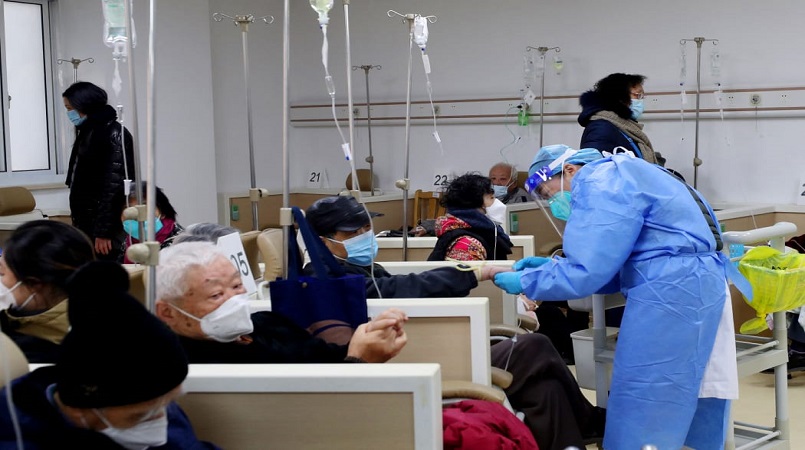
Former high school teacher Ailia was devastated when her 85-year-old father died after displaying Covid-like symptoms as the virus swept through their hometown in the southeastern province of Jiangxi.
While her father was never tested, Ailia and her mother were both confirmed positive around the same time and she believes Covid-19 was a cause in his death.
As hundreds of millions of Chinese travel to reunite with families for the Lunar New Year holiday starting 21 January, many will do so after mourning relatives who died in the Covid-19 wave that has raged across the world's largest population.
For many, bereavement was mixed with anger over what they said was a lack of preparation to protect the elderly before China suddenly abandoned its "zero-Covid" policy in December 2022 after three years of testing, travel restrictions and lockdowns.
Ailia, 56, said that she, like countless Chinese, had supported reopening the economy. Her father died in late December, weeks after China dropped its Covid-19 restrictions.
"We wanted things to open up, but not to open up like this - not at the expense of so many elderly people, which has a huge impact on every family," she said by phone.
On Saturday, China announced that there had been nearly 60,000 Covid-related hospital deaths since the end of "zero-Covid" - a 10-fold increase from previous figures - but many international experts say that is an undercount, in part because it excludes people who died at home, like Ailia's father.
Among those fatalities, 90 percent were 65 or older and the average age was 80.3 years, a Chinese official said on Saturday.
Many experts have said China failed to take advantage of keeping Covid-19 largely at bay for three years to better prepare its population for reopening, especially its hundreds of millions of elderly - criticism that China rejects.
Shortcomings cited included inadequate vaccination among older people and insufficient supplies of therapeutic drugs.
A Chinese official said on 6 January that more than 90 percent of people above aged 60 had been vaccinated, but the share of those over age 80 who had received booster shots was only 40 percent as of 28 November, the most recent date for which that data was available.
"If only they used the resources used for controlling the virus for protecting the elderly," said Ailia, who like many people interviewed declined to use their full name given.
Reuters reports Chinese officials have repeatedly cited the importance of protecting the elderly, announcing various measures, from vaccination drives to setting up a task force in Shanghai, China's biggest city, to identify high-risk groups.
Beijing's decision to end "zero-Covid" came after rare widespread street protests against the policy in late November, but public complaint over China's handling of the end of Covid curbs has largely been via heavily censored social media.
Several analysts said China's handling of Covid-19 had eroded confidence in the government, especially among upper-middle class urbanites, but they did not see it as a threat to the rule of President Xi Jinping or the Communist Party.
Patients are treated with intravenous infusion in a community healthcare institution in east China's Shanghai, 4 January, 2023. Photo: Fang Zhe / XINHUA / Xinhua via AFP
